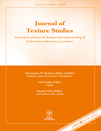
JOURNAL OF TEXTURE STUDIES
Scope & Guideline
Shaping Consumer Preferences through Texture Studies
Introduction
Aims and Scopes
- Food Texture Characterization:
The journal emphasizes the analysis and characterization of food textures through various instrumental and sensory methods, including rheological and tribological assessments. - Impact of Processing Techniques:
Research often explores how different food processing techniques affect texture, such as extrusion, thermal processing, and innovative cooking methods. - Consumer Perception and Behavior:
Studies frequently investigate how texture influences consumer preferences and perceptions, especially in relation to specific populations like children and the elderly. - Health and Nutrition:
The journal addresses the nutritional implications of food texture, particularly in developing foods suitable for individuals with swallowing difficulties or dietary restrictions. - Innovative Food Products:
There is a focus on the development of novel food products, including plant-based alternatives, and their textural properties, aiming to enhance consumer acceptability. - Mechanisms of Oral Processing:
Research delves into the mechanisms of oral processing and how food texture affects mastication and swallowing, providing a deeper understanding of food interactions in the mouth.
Trending and Emerging
- Dysphagia Management and Food Design:
Research focusing on developing texture-modified foods for dysphagia management has gained significant traction, highlighting the importance of accessibility and safety in food for vulnerable populations. - Plant-Based Food Textures:
With the rise in popularity of plant-based diets, there is an increasing emphasis on the textural properties of plant-based meat alternatives and how they can mimic traditional meat textures. - Novel Food Processing Technologies:
Emerging studies are exploring innovative food processing technologies, such as 3D printing and ultrasonic processing, to enhance the textural qualities of foods. - Interdisciplinary Approaches to Texture Research:
There is a trend towards interdisciplinary research combining food science, nutrition, psychology, and engineering to better understand the complexities of food texture and its effects on sensory perception. - Consumer-Centric Research:
A notable increase in studies focusing on consumer behavior, preferences, and sensory experiences related to food texture suggests a growing interest in market-driven food innovations.
Declining or Waning
- Traditional Texture Measurement Techniques:
There seems to be a decrease in studies relying solely on traditional texture measurement techniques, as researchers increasingly adopt more sophisticated, multi-dimensional methods. - Focus on Non-Functional Textural Attributes:
Research that does not directly link texture to functional outcomes or consumer preferences is becoming less common, as there is a growing emphasis on practical applications and implications. - Generalized Food Texture Studies:
The journal has seen a decline in generalized studies on food texture that do not target specific populations or health-related issues, indicating a shift towards more specialized research. - Aging Population Studies:
Although still relevant, the frequency of studies solely focused on aging populations and their texture preferences has decreased, possibly due to a broader interest in diverse demographic groups.
Similar Journals

Future Foods
Exploring the future of sustainable food systems.Welcome to Future Foods, a cutting-edge academic journal published by Elsevier, dedicated to advancing the field of food science. As a prestigious Q1 journal in the Food Science category, it ranks impressively as #43 out of 389 in Scopus, placing it in the 89th percentile among its peers. Future Foods aims to explore innovative developments in sustainable food systems, novel food products, and the intersection of technology and food production, thus providing a platform for research that addresses global challenges such as food security and nutrition. With its focus on future-oriented solutions and trends in the food industry, this journal is essential for researchers, professionals, and students who are eager to contribute to the discourse around cutting-edge food science. Situated in the Netherlands, the journal serves the international academic community and fosters collaboration and knowledge sharing in the realm of food innovation.

Food Science of Animal Resources
Bridging Research and Practice in Food Science of Animal ResourcesFood Science of Animal Resources is a prestigious, peer-reviewed journal published by the Korean Society of Food Science and Animal Resources, serving as a vital platform for disseminating advanced research in the fields of Animal Science and Food Science. Since its inception in 2018, the journal has quickly established itself with an impressive Q1 ranking in both categories for 2023, indicating its relevance and influence in the academic community—evident by its ranking of #23 in Animal Science and Zoology and #78 in Food Science among thousands of journals. Operating on an Open Access model since 2019, it enables unrestricted access to cutting-edge research for a global audience, facilitating collaboration and innovation. Its commitment to quality and rigor makes it an essential resource for researchers, professionals, and students dedicated to advancing knowledge in food safety, nutrition, and sustainable practices within the animal resource sector. Set against the vibrant backdrop of South Korea, the journal aims to bridge gaps in knowledge and foster communication among scholars and practitioners worldwide.
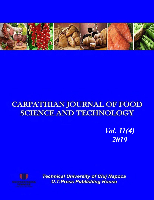
Carpathian Journal of Food Science and Technology
Unleashing Knowledge in Food Science and TechnologyCarpathian Journal of Food Science and Technology, a distinguished publication from the NORTH UNIV CENTER BAIA MARE, has been a pivotal platform for disseminating groundbreaking research in the field of food science since its inception in 2009. With an ISSN of 2066-6845 and an E-ISSN of 2344-5459, this Open Access journal aims to promote knowledge and innovation, offering unrestricted access to its content, thereby enhancing visibility for authors and facilitating a wider readership. Based in Romania, the journal plays a crucial role in advancing scientific inquiry within the agricultural and biological sciences, particularly focusing on contemporary food science issues. As it continues its convergence through 2024, the journal currently holds a Q4 ranking in the Food Science category, allowing it to carve out a unique niche within the academic community despite its current Scopus percentile ranking of 19th. Scholars, researchers, and students in the field will find the journal an invaluable resource for the latest advancements and discussions, making it an essential addition to their academic pursuits.
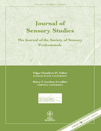
JOURNAL OF SENSORY STUDIES
Transforming Sensory Research for a Flavorful FutureWelcome to the Journal of Sensory Studies, an influential publication dedicated to advancing research in the fields of food science and sensory systems. Published by Wiley, this esteemed journal, with an ISSN of 0887-8250 and E-ISSN of 1745-459X, has been at the forefront of sensory research since its inception in 1986. With a commitment to high-quality scholarship, the journal holds a Q2 ranking in Food Science and a Q4 ranking in Sensory Systems, reflecting its significant impact in these specialized areas. Researchers and professionals will find a wealth of knowledge as the journal disseminates critical insights on sensory perception, food product development, and innovative methodologies in sensory evaluation. The journal does not currently offer open access options, making it crucial for institutions and scholars focused on sensory research to stay connected. As the field evolves, the Journal of Sensory Studies continues to redefine standards and forge pathways for future inquiry through its engaging articles, fostering a deeper understanding of sensory experiences and their implications.

JOURNAL OF FOOD PROTECTION
Empowering the future of food protection.JOURNAL OF FOOD PROTECTION is a prominent academic journal published by Elsevier, dedicated to the field of Food Science and Microbiology. With an ISSN of 0362-028X and an E-ISSN of 1944-9097, it serves as a vital resource for researchers, professionals, and students interested in the microbiological aspects of food safety and quality. Since its inception, the journal has evolved significantly, with coverage spanning from 1977 to the present, reflecting its long-standing commitment to advancing knowledge in this critical area. Recognized for its rigorous peer-reviewed research, the journal boasts a commendable impact factor and ranks in the second quartile in Food Science and the third quartile in Microbiology according to 2023 assessments. Its Scopus ranking also highlights its relevance, with significant placements in both Agricultural and Biological Sciences and Immunology and Microbiology. The JOURNAL OF FOOD PROTECTION is an essential platform for disseminating pioneering studies that address contemporary challenges facing the food industry and public health, making it an indispensable resource in the quest for food safety and innovation.
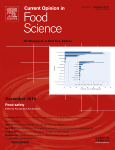
Current Opinion in Food Science
Leading the Conversation in Food InnovationCurrent Opinion in Food Science is a premier peer-reviewed journal published by ELSEVIER SCI LTD that focuses on the latest advancements and research in the domain of food science and technology. With its ISSN 2214-7993 and E-ISSN 2214-8000, this journal serves as a critical platform for researchers and professionals to share insights and opinions on emerging trends, innovations, and challenges faced in food science. The journal enjoys an impressive impact factor and ranks in the first quartile (Q1) in both Applied Microbiology and Biotechnology and Food Science, symbolizing its influence and reputation in the field. It is strategically located in the Netherlands and conducts its academic dialogue with a broad scope that includes essential topics in food safety, nutrition, and sustainable practices. Operating from 2015 to 2024, the journal has established itself as a critical resource for the global academic community, boasting excellent Scopus rankings—#9 out of 389 in Food Science and #6 out of 127 in Applied Microbiology and Biotechnology—indicating its high relevance and impact. Readers can look forward to insightful articles and comprehensive reviews that bridge the gap between fundamental research and practical application in the ever-evolving food science landscape.
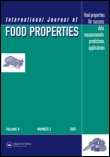
INTERNATIONAL JOURNAL OF FOOD PROPERTIES
Transforming food science through open access research.INTERNATIONAL JOURNAL OF FOOD PROPERTIES, published by TAYLOR & FRANCIS INC, is a leading platform for disseminating high-quality research in the field of food science. With an ISSN of 1094-2912 and E-ISSN of 1532-2386, this journal has been committed to open access since 2018, ensuring that groundbreaking studies are readily available to global audiences. The journal has steadily gained recognition for its contribution to the discipline, achieving a Q2 ranking in Food Science and placing in the 68th percentile among its peers according to Scopus metrics. Covering a wide array of topics related to the properties and applications of food, it serves as a valuable resource for researchers, professionals, and students alike. With coverage extending from 1998 to 2024, the journal continually seeks to advance knowledge and foster innovation within the food science community, making it a pivotal publication for anyone serious about this vital field.
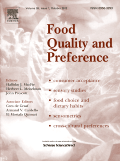
Food Quality and Preference
Innovating Understanding of Flavor and NutritionFood Quality and Preference is a leading journal in the fields of food science and nutrition, published by ELSEVIER SCI LTD. With a notable impact factor and ranking in the Q1 quartile for both food science and nutrition and dietetics in 2023, this journal consistently publishes high-quality research that explores the multifaceted aspects of food preferences, sensory evaluation, and consumer behavior. The journal provides a critical platform for researchers, professionals, and students engaged in the study of food quality, aiming to enhance our understanding of how sensory properties, nutritional value, and consumer choices intersect. Its commitment to disseminating cutting-edge findings makes it an essential resource for advancing the field and informing practice in both academic and industry settings. Access to the journal is via subscription, allowing for robust engagement with pioneering research that shapes current and future practices in food-related studies.
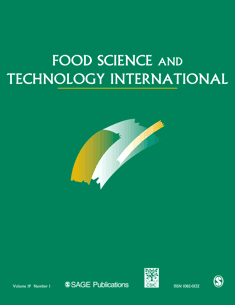
FOOD SCIENCE AND TECHNOLOGY INTERNATIONAL
Advancing innovation in food science and technology.FOOD SCIENCE AND TECHNOLOGY INTERNATIONAL, published by SAGE Publications Ltd, is a premier journal in the fields of food science and technology, serving as a crucial platform for the dissemination of innovative research and practical applications from 1995 through to 2024. With an impact factor reflecting its significant standing—ranking in the Q2 quartile for Chemical Engineering, Food Science, and Industrial and Manufacturing Engineering—this journal plays an instrumental role in advancing the interdisciplinary study of food systems. Researchers, professionals, and students can access high-quality contributions that address the latest developments and trends in food technology, safety, and processing. Located in the United States, FOOD SCIENCE AND TECHNOLOGY INTERNATIONAL also boasts commendable Scopus rankings, ensuring its articles are both relevant and widely cited within the academic community. As a vital resource for anyone engaged in food science research, этот журнал fosters knowledge sharing and innovation in the ever-evolving landscape of food technology.

CZECH JOURNAL OF FOOD SCIENCES
Exploring Innovative Solutions for Food Safety and TechnologyCzech Journal of Food Sciences is a premier publication in the field of food science, disseminating vital research since its inception in 1999 and transitioning to Open Access in 2007. Published by the Czech Academy Agricultural Sciences, this journal facilitates the exchange of knowledge among researchers, professionals, and students dedicated to advancing the understanding of food systems, safety, and technology. With an ISSN of 1212-1800 and an E-ISSN of 1805-9317, it holds a respectable position with a Q3 ranking in the Food Science category for 2023, illustrating its commitment to high-quality research despite its Scopus rank of 209 out of 389, situated in the 46th percentile. Located in the heart of the Czech Republic, at TESNOV 17, PRAGUE 117 05, this journal serves as an essential resource for those involved in agricultural and biological sciences, paving the way for innovative discoveries and applications in food science.